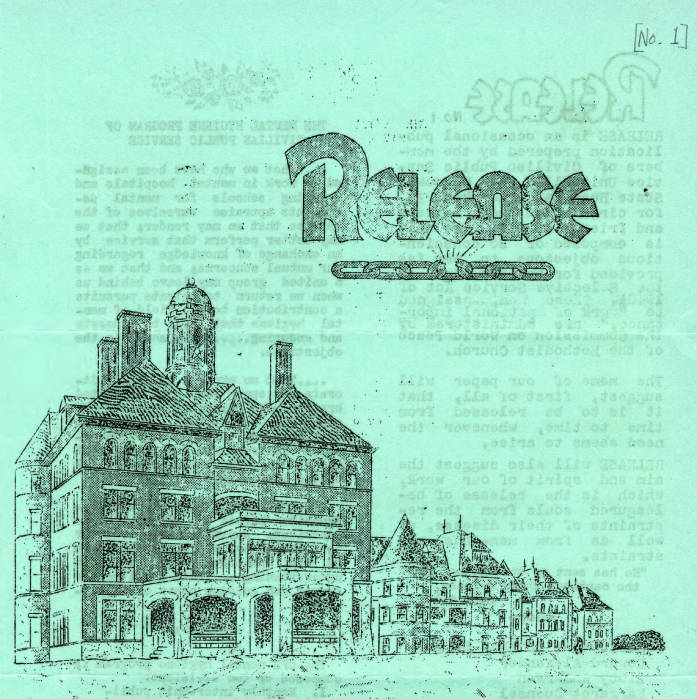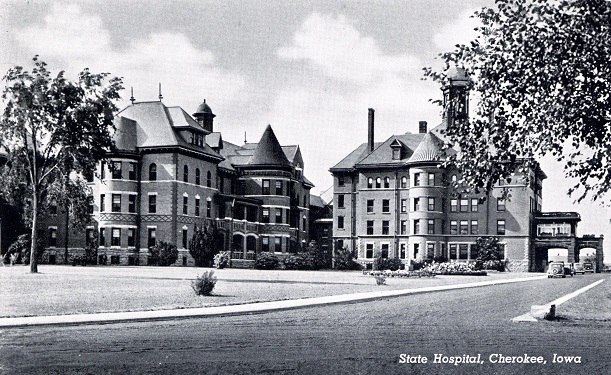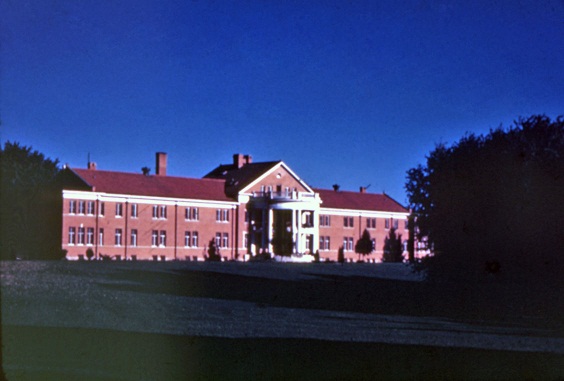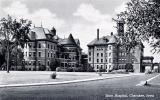CPS Unit Number 131-01
Camp: 131
Unit ID: 1
Title: Cherokee State Hospital
Operating agency: MCWP
Opened: 2 1944
Closed: 5 1946
Workers
Total number of workers who worked in this camp: 34
-
 CPS Camp No. 131The men at Camp 131 published three issues of the newsletter Release from November 1944 to March 1946.Digital image from the American Friends Service Committee: Civilian Public Service Records (DG 002), Swarthmore College Peace Collection, Swarthmore, Pennsylvania
CPS Camp No. 131The men at Camp 131 published three issues of the newsletter Release from November 1944 to March 1946.Digital image from the American Friends Service Committee: Civilian Public Service Records (DG 002), Swarthmore College Peace Collection, Swarthmore, Pennsylvania -
 CPS Camp No. 131State Hospital, Cherokee, Iowa.Digital image from American Friends Service Committee: CPS Records (DG002), Swarthmore College Peace Collection, Swarthmore, Pennsylvania
CPS Camp No. 131State Hospital, Cherokee, Iowa.Digital image from American Friends Service Committee: CPS Records (DG002), Swarthmore College Peace Collection, Swarthmore, Pennsylvania -
 CPS Camp No. 131Methodist Unit. Camp No. 131.Digital Image from Center on Conscience and War Records (DG 056), Swarthmore College Peace Collection, Swarthmore, Pennsylvania
CPS Camp No. 131Methodist Unit. Camp No. 131.Digital Image from Center on Conscience and War Records (DG 056), Swarthmore College Peace Collection, Swarthmore, Pennsylvania
CPS Unit No. 131, a Mental Hospital unit at Cherokee State Hospital in Cherokee, Iowa operated by the Methodist Commission on World Peace, opened in February 1944 and closed in May 1946. The men served as hospital attendants.
Cherokee State Hospital, one of the two units operated by the Methodist Commission on World Peace, was located in Cherokee, Iowa in the northwestern part of the state.
Directors: Warren Quesnel, Edmund Sinden
The Methodist Commission on World Peace opened two units to support their conscientious objector constituencies. The units included men who had reported other religious affiliations at the time they entered CPS.
The hospital, built for seven hundred patients, in December 1945 housed 1,729 patients. The buildings were overtaxed and understaffed with patient beds in the halls.
Men in the unit served as hospital attendants with patients, working long hours and facing very difficult conditions.
Early on, attendants lived in the same wards where patients resided. In the 1940s, the hospital added a dormitory for employees.
One CO, in a 1988 survey reflecting on his experience at the mental hospital, reported the following.
For the year and a half that I was at Cherokee State Hospital, we never went to the dining hall but were greeted by other hospital attendants with jeers like “yellow-belly” and “Cee-O”. At first the patients echoed the employees’ taunts, but within a few months that ceased. Though the administration made feeble attempts to make us welcome, the hospital staff continued to be uniformly negative toward us. (in Sareyan p. 240)
The various denominations operating camps provided financial support for the COs to cover their modest maintenance, medical and dental needs, as well as a small monthly allowance. One Methodist woman from Minneapolis, Kansas wrote to CPS leaders about her efforts to persuade others in her congregation to support COs.
Our [Methodist] women’s magazine urged us to send money and gifts to our World Peace Commission to be used for CPS camps. I called their attention to it and they voted to send $5.00 out of the treasury. But some A No. 1 propagandists got wind of it and raised a furor and now the leaders are confused and don’t know what to do. Our pastor’s wife suggests we drop it to keep down trouble. But I assure you that a few of us will do something; I hope several times over that amount. Also, as I have opportunity, I will see that the truth is given out. (Mrs. Omar Joyce in Goossen, p. 24)
While the Methodist Commission on World Peace was able to fund its COs, Mrs. Joyce illustrated the conflicts faced in congregations, and the important role women like her played in bringing the need before the congregants.
The men published three issues of a camp paper Release from November 1944 through March 1946.
For more information on women COs see Rachel Waltner Goossen, Women Against the Good War: Conscientious Objection and Gender on the American Home Front, 1941-47. Chapel Hill, NC: The University of North Carolina Press, 1997.
See Alex Sareyan, The Turning Point: How Persons of Conscience Brought About Major Change in the Care of America’s Mentally Ill. Scottdale, PA: Herald Press, 1994.
See also Mulford Q. Sibley and Philip E. Jacob, Conscription of Conscience: The American State and the Conscientious Objector, 1940-47. Ithaca, NY: Cornell University Press, 1952.
Swarthmore College Peace Collection, Camp periodicals database.
For more in depth treatment of mental health and training school units, see Steven J. Taylor, Acts of Conscience: World War II, Mental Institutions, and Religious Objectors. Syracuse, NY: Syracuse University Press, 2009, including information on the CPS Union, pp. 126-135.
http://en.wikipedia.org/wiki/Cherokee_Mental_Health_Institute


